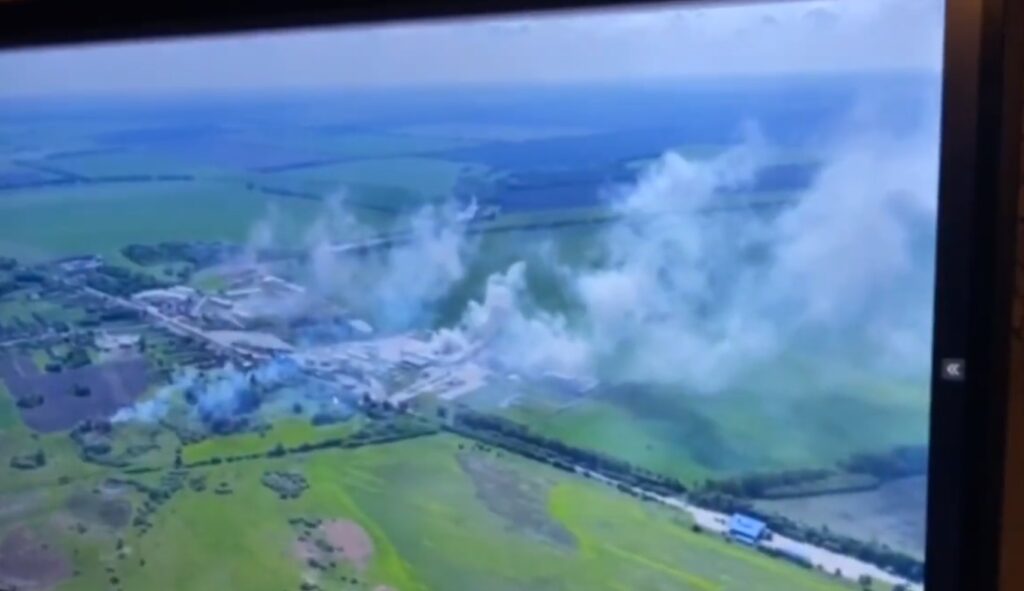Russian Security Checkpoints in Belgorod Assaulted
Earlier today, unconfirmed reports of an attack on Russian territory in Belgorod Oblast flooded social media. Drone footage shared reportedly shows a limited use of heavy armor and light armored vehicles in Russian territory. At the same time, various claims made by combatant groups suggest the involvement of Russian voluntary forces fighting on the Ukrainian side taking the leading role in the assaults.
Since 2014, the Armed Forces of Ukraine has included a number of volunteer and multinational groups taking part in the armed struggle against Separatist forces in the Donbas region. However, after the 2022 Russian Invasion of Ukraine, the number of these groups rapidly increased with some interesting additions. Two of those armed organizations include Russian volunteers: the Russian Volunteers Corps and the “Freedom of Russia” Legion. Despite the nationality of the members, the groups remain two separate entities.
The Volunteers Corps is led by Denis Kapustin, an alleged nationalist with ties to the Russian neonazi movement who decided to form a military unit consisting of people of similar beliefs in Ukraine. The “Freedom of Russia” Legion is a unit formed from Russian Armed Forces prisoners of war who decided to participate in armed struggle against the Russian Federation for a number of personal reasons, seeking an end to Vladimir Putin’s government through their actions. The group of soldiers from the Russian Volunteers Corps (RDK) had already conducted a smaller incursion in the Belgorod Oblast earlier this year causing havoc and disarray, allegedly killing civilian personnel. That raid, however, took place under the cover of darkness and was largely publicised after the raiding force had recrossed the border back into Ukraine.
The Russian volunteer units appear to have assaulted Russian border guards positions in the villages of Kozinka and Grayvoron. Unlike the earlier raid the imagery shared on social media appears to suggest the use of heavy armored equipment. It is suggested that the Russian Army fielded token forces in the region and has been unable to swiftly respond to the crisis at the border. It is also possible that any air operations in Belgorod might be suspended due to the recent loss of numerous aircraft by the Russian forces last week in the area by unidentified anti-aircraft weapons.
In the early hours of the morning, local time, the “Freedom of Russia” Legion released a video statement addressing Belgorod residents, saying: “Residents of Russia! We are Russians just like you. We are distinguished only by the fact that we no longer wanted to justify the actions of criminals in power and took up arms to defend our and your freedom… Be brave and have no fear because we are coming home! Russia will be free!”
Governor of the Belgorod region, Vyacheslav Gladkov, said in a statement “A sabotage and reconnaissance group of the Armed Forces of Ukraine entered the territory of the Grayvoron district. The armed forces of the Russian Federation, together with the border service, the National Guard and the FSB, are taking the necessary measures to eliminate the enemy.”
At around 3PM (Moscow time) Kremlin Spokesperson Dmitry Peskov confirmed that Putin has been informed of the incursion and sought to quell fears stating that “work is underway to… destroy this sabotage group.” He added that “we perfectly understand the purpose of such sabotage – to divert attention from the Bakhmut direction, to minimize the political effect of the loss of Artemovsk by the Ukrainian side.”
The objectives of the assault conducted by the Ukraine-aligned Russian volunteer units is not yet clear. It may be a cross-border raid in strength or it could be an effort by the units to establish a foothold. While it is unlikely to be the focus of Ukraines expected major offensive it may draw more Russian forces to the region, diverting them from other parts of the frontline. The language used by the Russian volunteer units has framed the raid as an act of national liberation.

